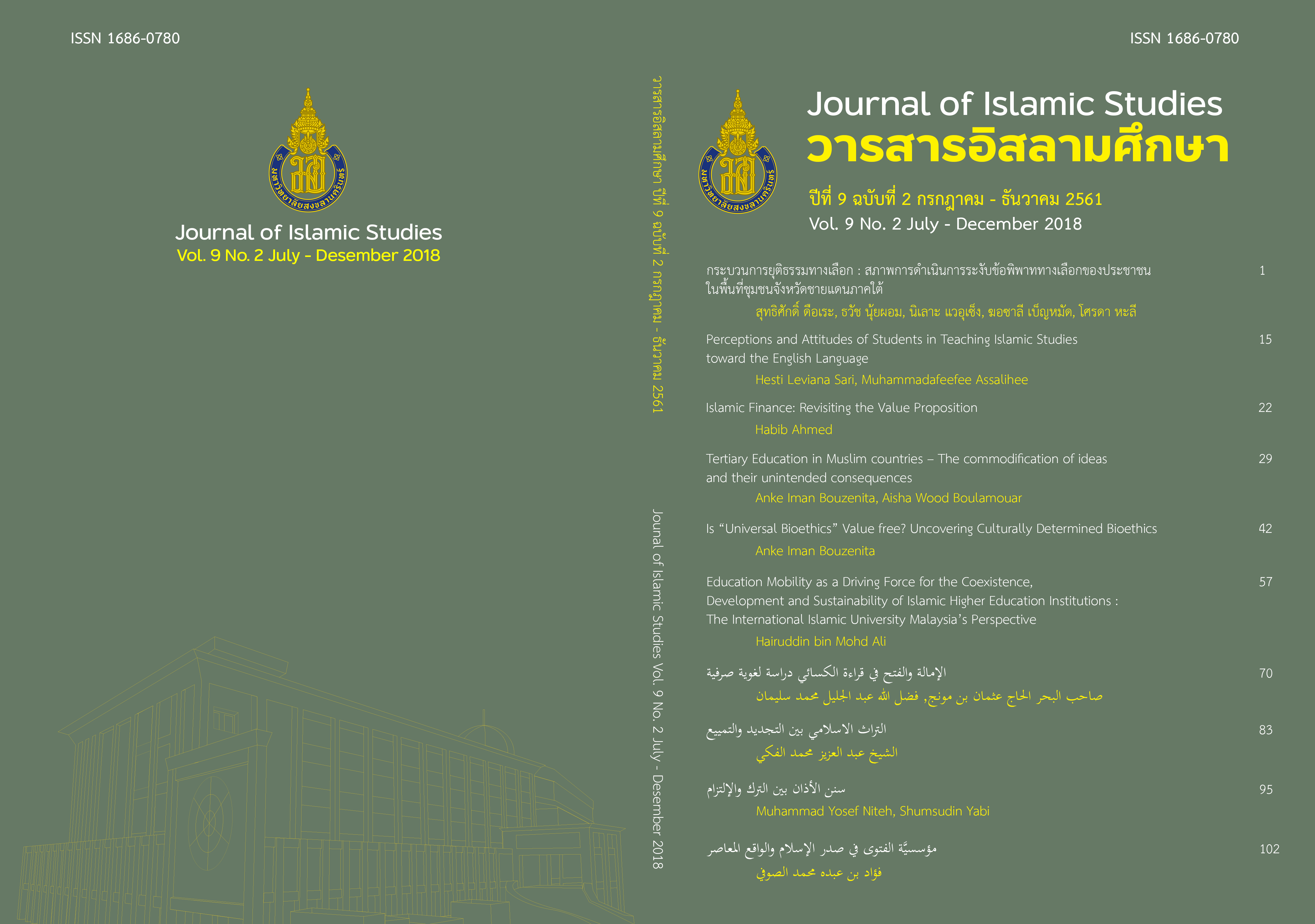Is “Universal Bioethics” Value free? Uncovering Culturally Determined Bioethics
Keywords:
Bioethics, Islamic Bioethics, Universal Bioethics, Secular Bioethics, Beauchamp and Childress, Principlism, Autonomy, WorldviewAbstract
The supposition of this paper is that bioethics in its different strata is culturally determined. Other than universal in the sense of ‘neutral’, secular bioethics-which is internationally leading the field of bioethics academically and in praxis - is an expression of a particular, materialistic worldview that does generally not consider spiritual or other-worldly dimensions. Islamic culture, based on the particular worldview of tawhid - the profession that there is only one Creator who created the universe and mankind, and that the purpose of human existence is the servitude to Him - has produced its own bioethics. Under Islamic bioethics, the human body is not the person’s possession, but rather an entrusted good (amanah) which will return to its Creator after death. The human being will be held responsible for its interaction and care taking of its physical shape. Beginning and end of life are predetermined and not subject to human decision making. The paper looks into the most prominent secular bioethical model, Beauchamp’s and Childress’ principlist approach (Principles of Biomedical Ethics, 2013), more particularly the principle of autonomy, and how it intersects in practice against a background of Muslim recipients in a majority or minority background. Discussed case studies will focus on beginning and end-of-life decisions, such as abortion, prenatal and preimplantation diagnostics, termination of life support, donor consent to organ transplantation after death, euthanasia, and their evaluation through the principle of autonomy at the intersection of secular and Islamic bioethics.
References
Chattopadhyay, Subrata, and Raymond de Vries (2013). Respect for cultural diversity in bioethics is an ethical imperative. Journal of Medicine, Health Care and Philosophy. 16:639-645
Atighetchi, D. (2007). Islamic Bioethics: Problems and Perspectives. Dordrecht: Springer.
Beauchamp, T. L. & James, F. C. (2009). Principles of Biomedical Ethics. (6th ed.), New York: Oxford University Press.
Bouzenita, A. I. (2011). The dilemmas of Islamic Bioethics in the 21st century: Procrustes Islamized. American Journal of Islamic Social Sciences, 28(1), 44-75.
De Vries, R. & Rott, L. (2011). Bioethics as Missionary Work. The Export of Western Ethics to Developing Countries. In Catherine Myser (Ed.), Bioethics Around the Globe. New York: Oxford University Press.
Engelhardt, T. (2003). Introduction: Bioethics as a Global Phenomenon In J.F. Peppin and M.J. Cherry (Eds): Annals of Bioethics. Regional Perspectives in Bioethics. New York: Routledge.
Ethical Principles for Medical Research Involving Human Subjects (Helsinki Declaration) http://www.wma.net/en/30publications/10policies/b3/ accessed 13 June 2016
Fazlur Rahman (1998). Health and Medicine in the Islamic tradition. Change and Identity. Chicago: Kazi Publications.
Hamdy, S. (2012). Our Bodies Belong to God. Organ Transplants, Islam, and the Struggle for Human Dignity in Egypt. Berkeley: University of California Press.
International Ethical Guidelines for Biomedical Research Involving Human Subjects. http://www.cioms.ch/, accessed 13 June 2016.
Landman, W. & Schueklenk, U. (2005). Editorial. Developing World Bioethics. 5(3), iii-vi.
Langlois, A. (2013). Negotiating bioethics: The governance of UNESCO’s Bioethics Programme. Taylor and Francis, e-book.
Liddy, M. (2000). New body snatchers: Analyzing the effect of presumed consent organ Donation Laws on Privacy, Autonomy, and Liberty, Fordham Urban Law Journal,
28:815. HeinOnline.
Macpherson, C. F. (2007). Global Bioethics: did the universal declaration on bioethics and human rights miss the boat? Journal of Medical Ethics. 33, 588-590.
Marshall, P. & Koenig B. (2004). Accounting for Culture in a Globalized Bioethics. Journal of Law, Medicine and Ethics, 32, 252-266. Retrived from https://www.merriam-webster.com/dictionary/secularism. Retrieved July 2018.
Rahman F. (1998). Health and Medicine in the Islamic tradition. Change and Identity. Chicago: Kazi Publications.
Rathor, M. Y., Abdul Rani, M. F., Bin Mohamad Shah A. S., Bin Leman, W. I., Akter, S. F. U., Bin Omar, A. M. (2011). The Principle of Autonomy as Related to Personal Decision Making Concerning Health and Research from an ‘Islamic Viewpoint’. Journal of the Islamic Medical Association of North America. 43, 27-34.
Ryan, M. A. (2004). Beyond a Western Bioethics? Theological Studies 65, 158-177.
Sachedina, A. (2009). Islamic biomedical ethics: Principles and application. New York: Oxford University Press.
Shabana, A. (2013). Religious and cultural legitimacy of bioethics: lessons from Islamic bioethics. Medical Health Care and Philosophy, 16(4), 671-677. DOI 10.1007/
s11019-01309472-6
Simpson, R. (2011). Perspectives on Biomedicine and Biomedicinal Ethics in Contemporary Sri Lanka. In Catherine Myser (Ed.), Bioethics Around the Globe. New York: Oxford University Press. P.39ff.
Snead, C. O. (2009). Bioethics and Self-Governance: The Lessons of the Universal Declaration on Bioethics and Human Rights. Journal of Medicine and Philosophy, 34, 204-222.
Solomon, D. (2006). Domestic disarray and imperial ambition: Contemporary applied ethics and the prospects for global bioethics. In Tristram Engelhardt (Ed): Global Bioethics: The Collapse of Consensus. (pp.335-361). Salem, Mass: Scrivener.
UNESCO Declaration on Bioethics and Human Rights 2005. Retrived from http://www.unesco.org/new/en/social-and-human-sciences/themes/bioethics/bioethics-and-human-rights/
Weeramantry, C.G. (2003). Universalising International Law. Leiden: Brill.
Westra, A. E., Willems, D. L. & Smit, B. J. (2009). Communicating with Muslim parents: ‘the four principles’ are not as culturally neutral as suggested. European Journal of
Pediatrics, 168, 1383-1387, DOI: 10.1007/s00431-009-0970-8
Downloads
Published
How to Cite
Issue
Section
License
Copyright (c) 2018 Journal of Islamic Studies

This work is licensed under a Creative Commons Attribution 4.0 International License.
All articles Published in The Journal of Islamic Studies are author’s opinions, and not the responsibility of the Faculty of Islamic Sciences nor the editorial board. However any citation should be referred to the journal.
















